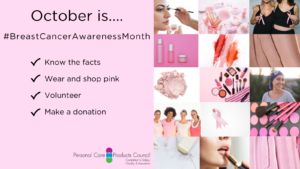Breast Cancer Awareness and COVID-19
Lezlee Westine
President and CEO, Personal Care Products Council
Each October, communities across the country align to raise awareness for breast cancer and promote the need for education, screening, early detection, new treatment therapies and patient support. With sustained focus over the last 40 years, significant advances have increased survival rates and improved the quality of life for the one in eight people diagnosed with the disease.
The pandemic has impacted our everyday lives in countless ways, including delays of life-saving screening tests necessary for the early detection and treatment of breast cancer. Mammogram rates across the country are down significantly versus screenings at pre-COVID-19 levels, as hospitals shifted their focus to treat those diagnosed with COVID-19 and patients opted to delay screening tests for fear of contracting the virus.
Although the pandemic has caused tremendous devastation and loss of life, it is also a reminder that we are all in this together. By uniting as a community to face the health and safety consequences of this virus, we continue to demonstrate our resilience when we work together against a common enemy. Breast cancer is no different.

More than 30 years ago, the beauty and personal care industry came together to support women being treated for cancer. Look Good Feel Better was the first program of its kind to help cancer patients manage the appearance-related side effects from treatment. The program was based on the belief that by helping to improve appearance, the workshops could also improve morale, confidence and hope. Having now served more than 2 million people in 27 countries, the program helps women – and men and teens – face cancer with confidence. Look Good Feel Better is a clear demonstration of the good that can happen when we unite behind a larger purpose.
While in-person LGFB workshops have been suspended through the end of 2020 due to COVID-19 health and safety concerns for participants, volunteers and hospital staff partners, the beauty industry’s signature philanthropic program offers live virtual workshops as a safe, convenient way for women to realize the benefits of the program from the comfort of their homes. Truly among the most vulnerable of populations, anyone who is being treated for cancer needs to take extra precautions to ensure their health and safety.
As an industry committed to women’s health and well-being, many beauty and personal care companies – including Avon, The Estée Lauder Companies, Mary Kay, Revlon and Henkel, among others – support longstanding educational programs and campaigns for breast cancer. In addition to raising awareness, these companies advocate for public policies that support reproductive health; commit funds for life saving research and treatments; and provide emotional support programs for the millions of men, women and teens affected, directly or indirectly, by breast cancer.
While researchers around the world are working to advance breast cancer treatment and eradicate the disease, we know that early detection is key to more available treatment options, increased survival and improved quality of life. This makes routine breast cancer screenings all the more important even during COVID-19. Many hospitals and other healthcare facilities across the country have reopened and are offering mammograms, ultrasounds and MRIs. If you have postponed your mammogram because of COVID-19, check with your primary care physician or gynecologist about rescheduling.
Breast cancer impacts the lives of so many people. Together, we can show our support for those affected by the disease and celebrate its survivors with these simple acts:
- Know the facts
Know your risk factors and how to identify key symptoms of breast cancer. - Wear and shop pink
Help raise awareness for breast cancer by adding a touch of pink to your wardrobe. - Volunteer
Offer your time to an organization focused on the disease, such as the Breast Cancer Charities of America (BCCA) and Susan G. Komen. - Make a donation
Give a gift in honor of a survivor or loved one to help those still fighting against cancer. Donate to a worthy organization, such as Look Good Feel Better, Susan G. Komen, or the Breast Cancer Research Foundation.

